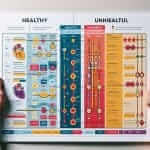“Dose” is a commonly used word in healthcare settings and frequently appears in the IELTS exam, especially in the Listening and Reading sections. Understanding its various meanings and applications can significantly enhance your performance.
Understanding “Dose”
Pronunciation: /dəʊs/
Part of speech: Noun
Definition: A measured amount of medicine or other substance taken at one time.
Synonyms: amount, quantity, portion, measure, dosage
Antonyms: whole, entirety
Example: The doctor prescribed a dose of antibiotics to treat the infection.
 Dose of Medicine
Dose of Medicine
“Dose” in the IELTS Exam
Listening Section
You might encounter “dose” in dialogues between doctors and patients, discussions about medication instructions, or lectures on health topics.
Example:
- Narrator: …and make sure to take the prescribed dose twice a day, with or without food.
Reading Section
“Dose” frequently appears in texts related to healthcare, medicine, and scientific research.
Example:
- Passage excerpt: Researchers are currently studying the effects of different doses of Vitamin D on bone health.
Using “Dose” in Your IELTS Speaking and Writing
While “dose” may not be a high-frequency word in everyday conversation, understanding its meaning and usage can still be beneficial for the IELTS exam, particularly in the Speaking and Writing sections where expressing yourself accurately and appropriately is crucial.
Speaking
- Part 2: Describe a time you had to take medication.
- Example: “The doctor prescribed me a strong dose of painkillers after my surgery.”
Writing
-
Task 1: Describe a graph showing the relationship between medication dose and patient recovery time.
-
Task 2: Discuss the advantages and disadvantages of self-medicating.
- Example: “One of the main dangers of self-medication is the risk of taking an incorrect dose, which can have serious consequences.”
Collocations and Idioms
Here are some common collocations and idioms related to “dose”:
- Correct/prescribed dose: The exact amount of medication that a doctor has told a patient to take.
- Example: “It’s essential to take the correct dose of medication to ensure its effectiveness.”
- High/low dose: A large or small amount of medication.
- Example: “Patients with severe infections may require a higher dose of antibiotics.”
- Daily dose: The amount of medication taken in a day.
- Example: “The recommended daily dose is two tablets, taken with water.”
- A dose of (something): This idiom means a certain amount of something, usually something unpleasant.
- Example: “He got a dose of his own medicine when she started ignoring his calls.”
Conclusion
Understanding the word “dose” and its related vocabulary is crucial for success in the IELTS exam, particularly in health and medicine-related contexts. By familiarizing yourself with its various meanings, applications, and common collocations, you can improve your comprehension and enhance your ability to express yourself accurately and confidently. Remember to pay close attention to context clues when encountering “dose” in the exam to determine its specific meaning.


